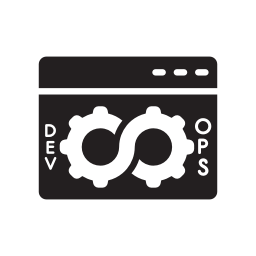

DevOps Culture @ Digitize01
 DevOps is the combination of cultural philosophies, practices, and tools that increases an organization’s ability to deliver applications and services at high velocity: evolving and improving products at a faster pace than organizations using traditional software development and infrastructure management processes.
DevOps is the combination of cultural philosophies, practices, and tools that increases an organization’s ability to deliver applications and services at high velocity: evolving and improving products at a faster pace than organizations using traditional software development and infrastructure management processes.
This speed enables organizations to better serve their customers and compete more effectively in the market.
At "Digitize01" we believe that DevOps practices can be successfully applied to other industries in addition to Information Technology (IT) and Communications, in the form of Agile Methodologies and Digital Transformation roadmaps.
DevOps is more than culture or methodology. It is a phenomenon to transfer methodology, culture practices, innovative approaches, and advanced technologies to create advanced automated workflows, pipelines to achieve higher speeds, cost efficiency, and business value added products and services. User Experience should be centre stage which will allows exponential growth and healthy profits for the business.
The ultimate goal for DevOps should be the enabling and progress of Industry 4.0 (The interconnected factory of the future. For more details about Industry 4.0, please click here.)
We can DevOps as:
- A methodology of software delivery centered at automating all what can be automated throughout the code development process and combining Dev and Ops workflows across the whole software lifecycle, from design to release to production support.
- A culture emphasing communication and collaboration. No silos should be allowed in DevOps tasks, tools, skills, and responsibilities. Devs and Ops plan and implement the future applications architecture and IT infrastructure together, own the overall process, and take full resposibility together, if something goes wrong they rectify problems together. the job is not done untill they release the software to production successfully and operated continuously, in a way, it is a continuous process.
- Technology innovation at heart to enable and make use of current and emerging technologies, examples include:
- Serverless Computing (Amazon AWS Lambda, Microsoft Azure Functions)
- Managed Microservices Architecure and Containerization (Docker, Kubernetes, OpenShift) including: Amazon Elastic Container Service (Amazon ECS), Amazon Elastic Kubernetes Service (Amazon EKS), Kubernetes-as-a-Service, Amazon AWS Fargate, etc.
- Blockchain Applications Infrastructure
- Distributed Databases
- Big Data Analytics
- Fog and Edge Computing for the Internet-of-Things (IoT), Artificial Intelligence (AI), Machine Learning (ML)
- Self-healing Infrastructure
- Other cutting-edge technology
The Business Value of DevOPs
Implementing DevOps best practices and workflows saves time and money for the business, increases software lifecycle predictability, build a culture of innovation and experimentation, and motivate every member of staff to try their best and encouraging member to take ownership for everything they do.
DevOps Practices Saves Time and Money Through Automation
The benefits of automation are well documented; it increases productivity, cuts cost and minimizes errors. It eliminates repetitive manual tasks, freeing us up to be more innovative. By that logic, attempting to automate everything possible is surely a sensible a sensible thing to do.
Quite a few of IT operations are routine and repetitive tasks. Most of them can be automated using scripts, but if the scenario differs, the script fails — and the scenarios in production vary quite a lot. At Digitize01 our automation stack involving the following:
- Implementing DevOps principles of Infrastructure-as-CODE (IaC), including: Terraform and Ansible
- Continuous Integration (CI), Continuous Delivery (CD), Continuous Testing (CT), Continuous Security (CS). Continuous Security is the addressing of security concerns and testing in the Continuous Delivery pipeline, and is as much a part of continuous delivery as operations, testing, or security is a part of the DevOps culture. DevSecOps is the philosophy of integrating security practices within the DevOps process. DevSecOps involves creating a 'Security as Code' culture with ongoing, flexible collaboration between release engineers and security teams. In addition to Continuous Deployment (CD) is a software release process that uses automated testing to validate if changes to a codebase are correct and stable for immediate autonomous deployment to a production environment.
- Ensure the uniformity of task scenarios and infrastructure immutability, so automation becomes 100% efficient and helps greatly reduce the amount of time and effort spent on routine and repetitive tasks.
DevOps Increases Software Lifecycle Predictability
Working under DevOps methodology drastically decreases the possibility of last-minute issues and greatly improves the predictability and outcomes of the software development projects.
DevOps Helps Build a Corporate Culture of Innovation
Improvement and innovation are impossible without experimentation. With the use of virtualizations and cloud computing the infrastructure can be treated like cattle instead of pets, where a server can be created and then destroyed very easy, and with minimum cost. In addition, the likelihood of error is negligible, and the failure of some idea is not someone's fault, it should be an indication that the system can be improved. evOps culture should cherish creativity and experimentation and should not make anyone guilty as the inteded outcome is bring improved and can only be good for the business.
DevOps Culture Helps Staff Stay Motivated and Take Ownership
When you are free to experiment and try out something new with literally zero negative consequences you are free to create, this creativity make you part of the business and automatically you feel ownership of what you have created.
Select the language of your preference